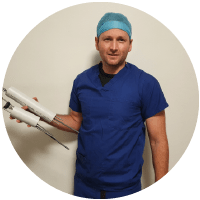Winning the Cutlers’ Surgical Prize

15 Mar 2022
Christopher Roche
RCS England member, Chris Roche, won the 2022 Cutlers' Surgical Prize. Chris tells us more about his research and the world-first prototype to patch the heart using minimally invasive robotic surgery.
I started cardiothoracic training in Wales in 2017 and paused my training to take formal time out to do a PhD at Sydney University. I was always interested in research and cardiothoracics as a specialty has a strong research flavour which was one of the reasons I was attracted to it.
My PhD aimed to ‘patch’ the heart after a heart attack. The idea is to put a patch made of hydrogel and biomaterials such as stem cell-derived cardiac cells onto the heart surface. This approach seems to protect against myocardial infarction-induced damage to the heart muscle and can restore some of the function lost after a heart attack.
I realised that most people were working towards an open surgical approach to patch-based heart muscle repair, so I started to invent surgical instruments to transplant patches with a minimally invasive approach. This took on a life of its own! It was a lot of work but it turned out to be one of the most interesting and inspiring pieces of research that I’ve done. My research has also made a few discoveries to do with the mechanism, which is important for clinical translation – you don’t subject patients to treatments that aren’t aligned with the underlying molecular events making it work.
This year was my second entry to the Cutler prize. It was a massive group effort, with a multidisciplinary team of academics and students with expertise in areas such as robotics and engineering. I was the only surgeon on the team and led the project. We built on my research and created three surgical instrument designs, eventually choosing ‘The HeartStamp’ to fully prototype. Our work presents an entirely new approach to myocardial regeneration, for the first time heart patches have been transplanted by a robotic minimally invasive keyhole surgery.
We uploaded all our data publicly so anyone in the world can take this forward. There are still unanswered questions and competing technologies such as mechanical pumps, but it’s a nice thought that if robotic minimally invasive patch repair takes off, our humble proof-of-concept work will have been the first paper to propose this approach.
I would encourage anyone interested in research and surgical innovation to enter the Cutlers’ Surgical Prize. I was very privileged to be able to do this work and would like to express my gratitude to the Worshipful Company of Cutlers and RCS England. I have been given a lot of help over the years from various people who became mentors to me, so I set up a grassroots mentoring service to give something back. Anyone can take part so if you would like to be a mentor (or a mentee) please do get in touch.
